Menu
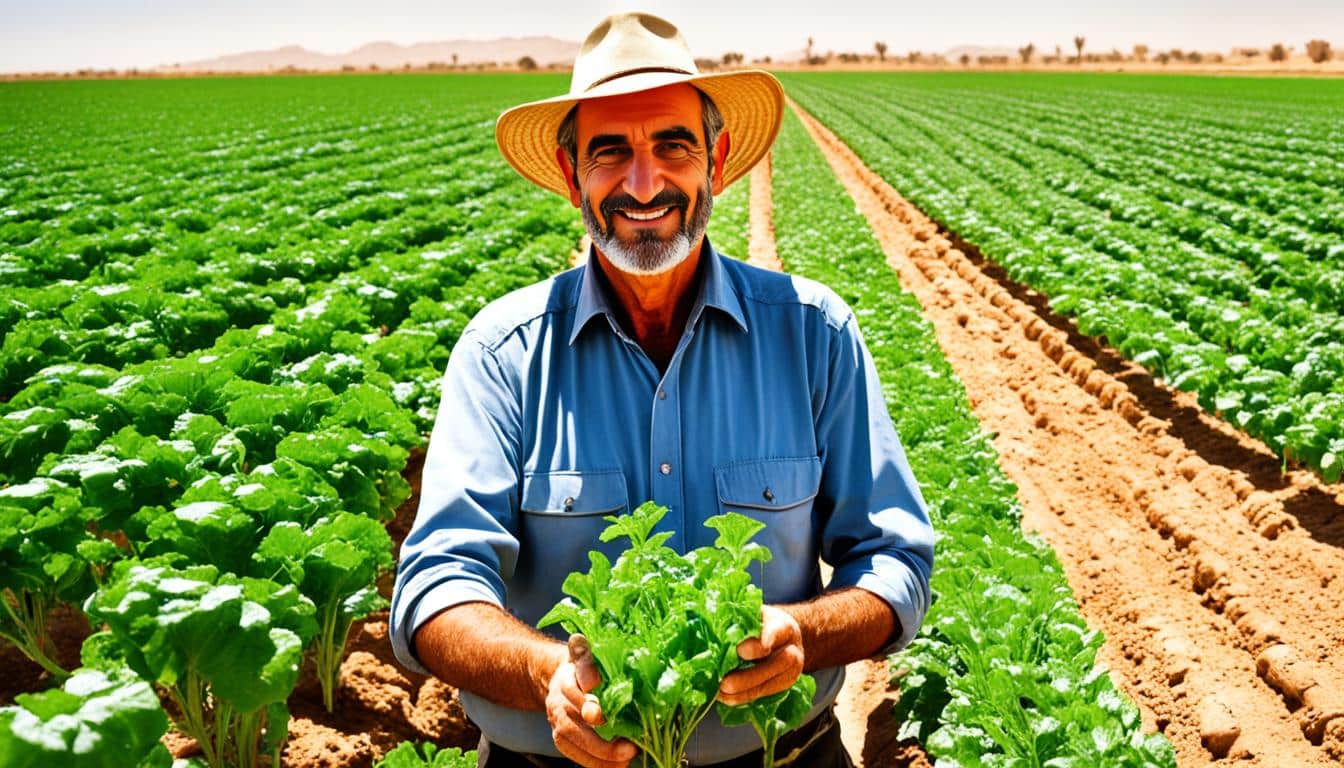
Did you know that Egypt needs more water than the Nile provides since the 1970s? The shift from having extra water to needing more highlights a big problem. This is made worse by Egypt’s rising population and their use of more water for everything they need.
Egypt must now import more ‘virtual water’ than ever before, and this trend is growing. This means they might import enough water to surpass what the Nile gives naturally. Egypt needs to focus on using water wisely in farming to make sure they can feed everyone, even as more people arrive.
Egypt’s economy has been growing, needing more water, and so has its food demands. Despite this, the water from the Nile has stayed the same. But, the people and economy have grown so much that the Nile can’t meet their needs anymore.
To tackle this challenge, Egypt must find new ways to use and manage water. This includes focusing on water-efficient farming and more sustainable agriculture. The country’s future depends on these efforts, ensuring the agricultural sector stays strong even as demands on water increase.
Egypt’s Nile connection is long and essential, but things are changing. More people are using the water, stretching it thin. The country’s farms need to use water better now. This is crucial because more people, about 2.1% each year since 1989, rely on the same water. The push for smarter water use has never been stronger.
In Egypt, the spotlight is now on saving water for farming. Years ago, Egypt had more Nile water than it needed. Now, it’s short about 40 km3 each year. This huge change calls for new ways to manage water. Each person’s share of renewable water in Egypt has dropped below a key scarcity level. This shows how crucial it is to use water wisely.
Egypt’s water situation shows signs of trouble. Most of its water comes from the Nile. Fields use up a big 85% of this water. To adapt, farmers have started using more groundwater, about 11% of all water for crops. But they still face many difficulties.
Despite some progress, farming in Egypt faces tough times. Soon, the demand for water might be more than what’s available. To cope, Egypt is starting to buy more water from elsewhere. Plus, more water gets taken before it reaches Egypt. And Ethiopia’s dam could mean even less water comes Egypt’s way.
Dealing with these problems will take a big team effort. It’s vital to learn new, smarter ways to farm and save water.
Population growth and economic development have exacerbated the pressure on Egypt’s water resources, transforming abundance into scarcity and making the pursuit of sustainable water management crucial.
In Egypt, the River Nile is key, providing 97% of the water. But it faces a big water deficit. To solve this, Egypt must find and use smart irrigation techniques. This is vital for keeping farming strong and water use smart.
Old ways of watering fields in Egypt waste lots of water. Now, eco-friendly farming methods are being used more. These better methods mean farms use water and land more wisely.
An investment of 55.5 billion pounds from the Central Bank of Egypt is helping. It aims to use water for farming in a better way. This will help farms grow more crops and use water more efficiently.
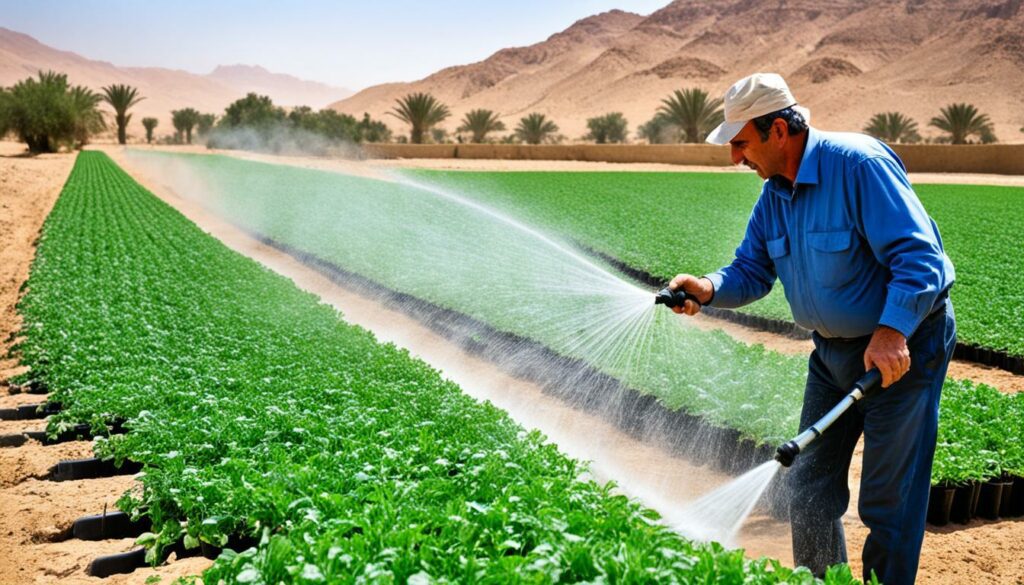
Drip irrigation is a top way to water plants. It puts water directly where plants need it the most. By using drip, farmers save a lot of water and work.
For example, Kamel Mohamed Abdou uses this method and has seen a big jump in crop growth. He uses less water and fertiliser but still gets a good harvest. This means not as much water is thrown away. Now, with not a lot of water to go around, every drop counts.
Sprinkler systems are another great way to water plants. They spread water evenly. This means less water is lost. And now, companies like Al-Modather see crops growing better because of these systems.
Efforts by groups like Winrock and CNFA are also making a big difference. They help farmers in Egypt learn new ways to water their fields. This makes farming better for everyone and helps with reducing hunger.
Finding new ways to use water well is key for Egypt’s future. By using the right irrigation techniques, Egypt can keep its farms going strong. This way, everyone in Egypt can have enough to eat.
Egypt is working hard to make its farming sustainable. It’s focusing on picking the right crops, taking care of the soil, and controlling pests correctly. These steps are to make farming more efficient, use water better, and not harm the environment.
In their plan, Egypt chooses the best crops for dry areas like wheat, rice, and corn. This way, they use water wisely. The country’s project, ISAI, is planting a lot of trees that do well in dry and salty places. They hope this will help grow sustainable farming.
Taking care of the soil is crucial. Egypt is working on improving over 42,000 hectares of land. They’re using smart farming methods, like planting different crops each season. This and other techniques make the soil richer without hurting the environment.
Egypt is also focusing on controlling pests naturally. This helps protect crops without damaging the environment. They’re using smart ways to reduce the use of harmful chemicals. The ISAI farms use these methods to look after millions of trees they’re planting.
| Aspect | Initiative | Details |
|---|---|---|
| Crop Selection | ISAI Pilot Farms | 30,000 trees; 542 trees/ha (freshwater), 130 trees/ha (saltwater) |
| Soil Management | Regeneration Projects | 42,000 hectares targeted for restoration |
| Integrated Pest Management | IPM Techniques | Minimises chemical pesticide use, promotes ecological balance |
Water conservation in Egyptian agriculture is a big deal nowadays. Over the years, Egypt’s water has gone from extra to not enough. This is mainly because Egypt’s population has gone up quickly. People there have also been doing more business. During the late 2010s, Egypt needed more water than it had, about 40 km3 less every year.
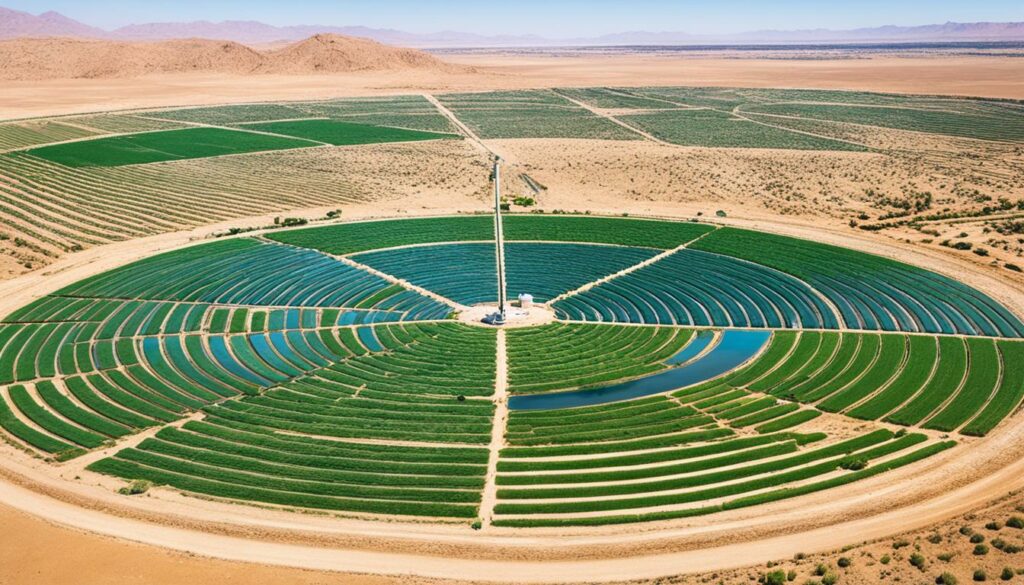
Egypt has seen strong economic growth and better living conditions. Yet, water is still in short supply. In 2017, each person only had a small amount of water to use. This isn’t enough, especially with more people and activities needing water.
The way Egypt farms is using up a lot of water, too. The way they water their crops is often wasteful. This is because they use too much water, which they don’t have a lot of. To fix this, farmers need to use better ways of watering their fields.
Using water more than once is smart and helps save water in farming. Egypt is working to reuse water, aiming to do more by 2037. But, some water is too polluted to use again. Fixing this problem would really help save more water.
Buying food that has water in it from other countries has helped Egypt a lot. But, soon Egypt might need even more water for food. This is a challenge they need to prepare for.
The Egyptian government is also looking into getting water from the sea. This could really help, with plans to do even more in the future. But, the best way to save water is by changing how people use water everywhere.
The Egyptian government is working to use water more wisely because water is running out. A lot of Egypt’s water goes to farming, which is a big challenge. They are working on national water management strategies to use water better in all areas.
In 2017, Egypt started the National Water Resources Strategy 2017-2037. It’s a big plan to deal with the country’s water issues for the next 20 years. The plan is to use water more efficiently and to have more water. They want to reuse some water, improve how they treat wastewater, and get more clean water from the sea. They aim to use water better in farming, which uses most of Egypt’s water, to make farms more productive.
The government is giving farmers reasons to use less water. They’re helping pay for smart irrigation systems and giving discounts for using less water with new farming methods. They’re also teaching farmers how to save water. By doing all this, they’re trying to make Egypt’s farming more eco-friendly and ensure enough water for the future.
Innovation is key to making farming in Egypt more water-friendly. It’s hard to grow crops without enough water. But, new technology helps farms use water better, making them more sustainable.
Remote sensing and earth observations are at the heart of this progress. They give farmers up-to-the-minute details about their fields. This includes information about the health of plants, how wet the soil is, and the upcoming weather. With Egypt’s water feeding 92 million people, these high-tech tools are a must. They let farmers avoid using too much water and plan their watering times wisely. This reduces water waste.
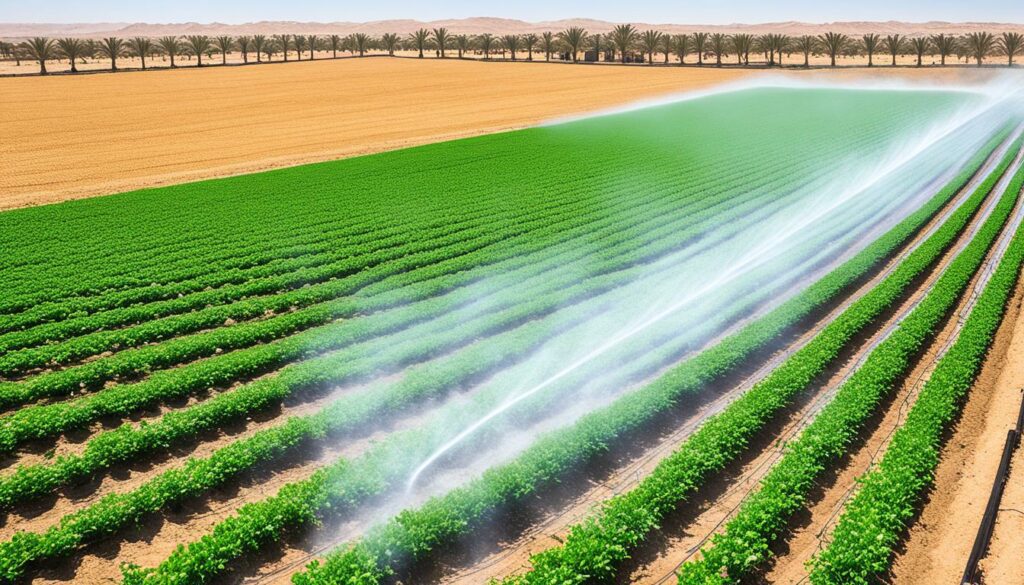
The United Nations says that across Africa, 1 in 3 people can’t easily get clean water. This fact shows why smarter water use is so important. In Egypt, using special technology helps farmers use less water from the Nile and still grow their crops well. This is all about using the water we have more wisely and making sure it lasts for everyone to use.
Smart irrigation systems are a game changer for how farming is done. They use sensors and Internet devices to check on the soil and plants all the time. Take Eman Essa, for example. By painting his fields with these smart systems, he’s cut water use by a fifth and saved on his workers’ pay. In a place like Egypt, where the Nile waters 7 out of 10 plants, not wasting water is vital.
The government in Egypt is also testing new water-cleaning technology. This helps make dirty water clean, so farmers can use it. The methods they’re trying out are quite advanced. They use tiny filters to take the bad stuff out of the water, making it safe for farming.
Looking to the future, smart irrigation plans and the data from the sky seem like Egypt’s best bet for keeping its farming sustainable. Even though lots of water gets wasted right now, technology could soon fix that. By 2050, Egypt might have even more water than it does now. This boost would be thanks to all the new tools we have today.
| Technology | Benefits |
|---|---|
| Remote Sensing and Earth Observations | Real-time data on crop health, soil moisture, and weather patterns; reduces water waste |
| Smart Irrigation Systems | Optimises water usage; reduces water and labour costs; monitors soil conditions continuously |
| Membrane Technology (Desalination) | Provides cost-effective access to purified water |
| Nanotechnology | Enhances water permeability; removes pollutants from water |
Water-efficient farming in Egypt makes a big difference. The Nile shifted from too much water in the 1960s to not enough in the late 2010s (about 40 km3 per year). This shows why water-efficient farming is now so important.
In the Nile Delta, farmers are using drip irrigation systems. These have cut their water use by up to 30%. Not only does this save water, but it also boosts how much food they can grow. It’s an example for the whole country to follow.
In the Western Desert, a careful balance is kept in using up to 0.5 BCM of groundwater each year. This way, water isn’t taken faster than it can be replaced. It’s a smart way to use water sustainably.
The table below shows how much water traditional farming uses compared to new, water-smart ways in different parts of Egypt:
| Region | Traditional Water Use (BCM/year) | Water-efficient Farming (BCM/year) | Reduction (%) |
|---|---|---|---|
| Nile Delta | 15.0 | 10.5 | 30% |
| Western Desert | 0.7 | 0.5 | 28.6% |
| Upper Nile | 12.3 | 8.6 | 30% |
These numbers show the significant water savings of modern farming. Egypt’s move towards sustainable water use can lead by example. It’s an important step, especially when water imports could be more than what the Nile can provide within this decade.
The country’s population grows by 2.1% each year, stretching water resources even thinner. It’s crucial that we keep learning from success stories like these. They help us work towards a future where we can grow food sustainably even with less water.
Teaching local farmers about efficient agriculture is vital for Egypt’s farming future. It’s key to involve communities in water-saving methods. Projects, backed by groups like the World Food Programme, show community work in changing farming for the better.
Egypt has a mix of farming lands, plus different water sources like the Nile and rainfall. With water for farming, homes, industry, and tourism, learning to manage water well is crucial. Good agriculture teaching helps farmers use water in a way that lasts.
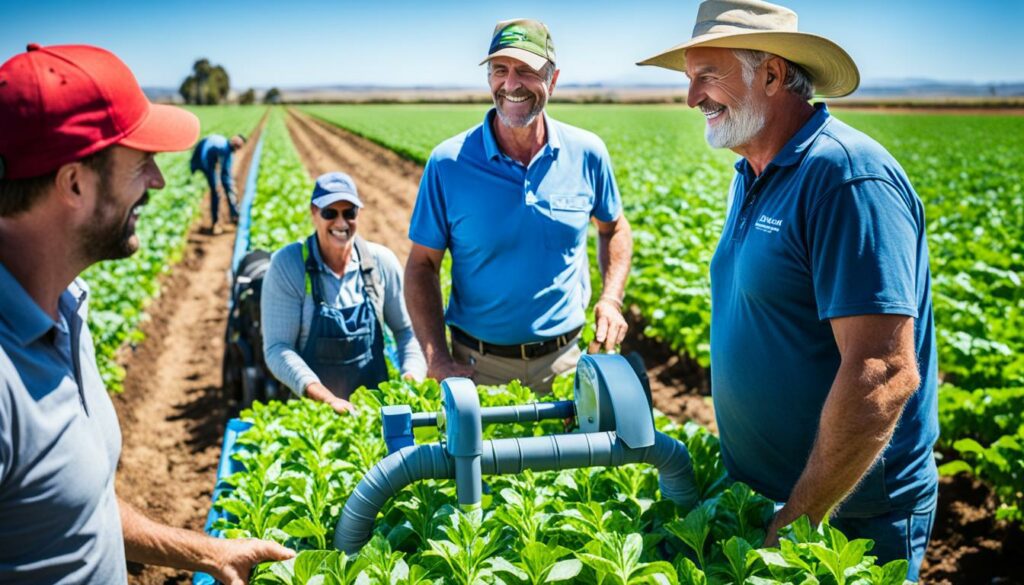
Since 2013, the WFP’s $7-million project has been making a big difference. It’s helping farmers fight climate change with better technology and farming methods. This has increased crop production by 30%, cut water use, and joined small farms together for efficiency.
Egypt’s government plays a big part in the country’s agriculture, with groups focusing on water and farms. They work on policies, training for farmers, and managing natural resources. This helps make sure Egypt’s farming is growing sustainably.
Over half a million farmers have learned new ways since 2013. This teaching has led to big changes: more wheat and sugarcane, and less water used. These moves aren’t just numbers; they’re making real benefits for Egypt’s future farming.
Water-efficient farming in Egypt has a huge impact on the economy. With less water from the Nile but more demand, using water wisely is key. It’s necessary to switch to farming methods that save water.
Looking close at the costs and benefits shows Egypt gains a lot from saving water on farms. High-tech ways of watering can cut water use by 30%. This means saving money on buying water and making farms more productive.
Better crop yields from using the land smartly add to Egypt’s economy. The country’s wealth and the money each person has increased. Water-smart farming helps keep this growth going, making the economy strong and farming sustainable.
World markets like products grown in ways that help the planet. This gives Egypt a chance to sell more by farming in a water-efficient way. There’s growing demand for eco-friendly goods around the world.
Importing crops that need a lot of water while focusing on growing valuable, water-smart products helps Egypt. It saves water and earns more money.
| Year | Water Availability Per Capita (m³/yr) | GDP Growth Rate (%) | GDP Per Capita Growth Rate (%) |
|---|---|---|---|
| 2017 | 628 | 4.4 | 2.3 |
| 2030 (Projected) | 534 | – | – |
Sticking with water-smart farming helps Egypt’s economy and uses water well. It’s good for business and the planet, showing that Egypt is ready for the future.
Egypt faces a big challenge with water scarcity. To deal with this, the country is turning to plants that need less water. This change is very important to keep farming going while saving water. Scientists are working on new plant types that can survive even when water is short.
In producing sugar, moving to sugar beets instead of sugar cane is a key step. Both are needed for Egypt’s sugar, but sugar beets are better because they use less water. This change is based on how much water each plant needs:
Growing sugar beets helps save water and makes Egypt’s sugar sector less at risk from water shortages.
Creating drought-resistant plants is central to Egypt’s farming plan. Lots of work is going into designing plants that can thrive with little water. Scientists and farmers are working together to create these crops.
The plan includes:
Thankfully, the work is paying off. Plants like quinoa, millets, and panicum are showing they can survive in dry conditions. This is a great step in facing water scarcity.
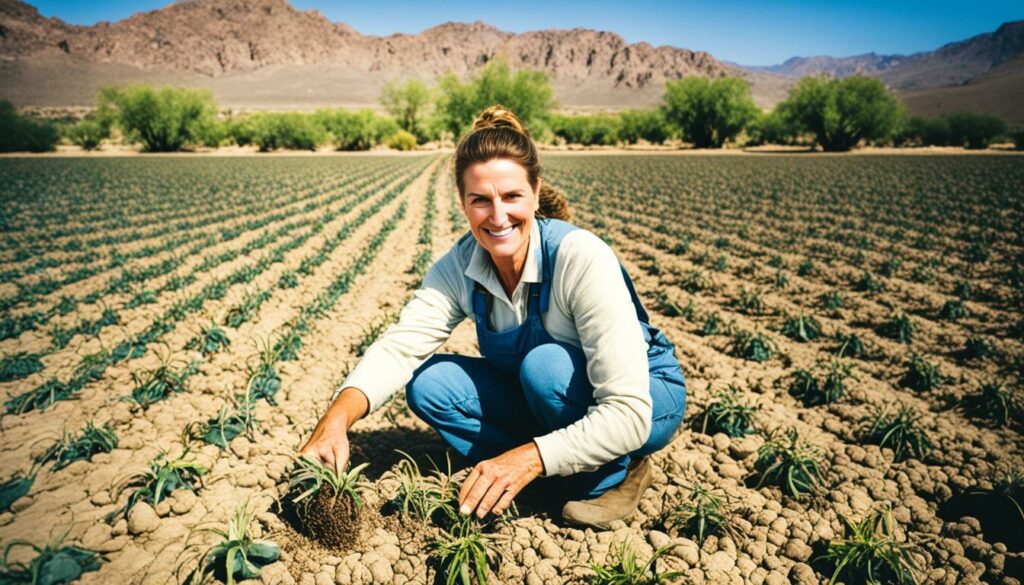
All these efforts show how important it is to change our farm crops. Choosing the right plants can help farming even when water is scarce. The focus is on using science to make farms more water-smart.
Water-efficient farming in Egypt is a big success thanks to innovative farmers and new technology. This approach doesn’t just tackle water problems. It can also be copied for farming in dry areas in the future.
In Egypt, GEBAL is leading the way in smart farming and greenhouse growing. They use solar-powered greenhouses that are very water-wise. This is crucial because Egypt has lots of oil but not much water.
The approach at GEBAL is helpful for local farmers. Mohamed Desouky at Dandara Nexus Farm says these greenhouses protect plants from bad weather. This reduces how much they lose to changing climates.
ICARDA’s Raised Bed Machine (RBM) is a great leap in farming technology. It can work an acre of land in just 30 minutes. This used to take a whole day and ten people. The RBM also boosts wheat yields and saves water.
In Sharqiya, the RBM upped wheat production by 15-20% and cut water use by 25%. The Nexus Farm model is also a success. It combines fishing and farming with smart water use and solar power.
Since 2016, the WEF Nexus has changed how water is managed in MENA. The program, with EU and BMZ funds, teaches about climate change and water saving. It has graduated farm trainers who spread their knowledge to more farmers.
These stories are just the start of the good news in Egypt’s farming. Mixing the latest tech with farmers who think outside the box is the key. Together, they are making a path to a farm-friendly future.
Implementing water-efficient farming in Egypt faces many challenges and barriers. In 2019, the country’s ecological footprint per person was 5.3 times higher than it should be. This shows a big need to fix these problems to save water conservation in farming.
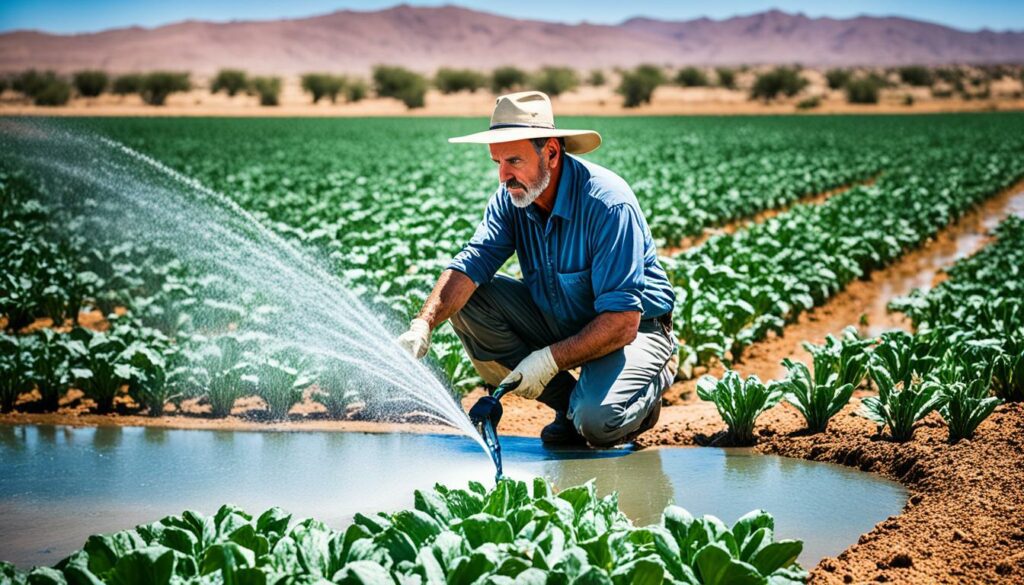
The rapid rise in temperatures is a major barrier to implementation. Over the past thirty years, Egypt’s average temperature went up by 1.6 degrees Celsius. This rise could reach 3 degrees Celsius because of climatic events like El Niño. It’s happening twice as fast as the global average and can cause severe water problems and more extreme climate changes.
It’s forecasted that by 2025, Egypt’s water supply could drop below 500 cubic meters per person. This is considered “absolute scarcity” by experts. If global temperatures go above 1.5 degrees Celsius, the Nile Delta faces big risks. These include more water evaporation, less rain, land sinking, and higher salt levels. This situation makes it crucial to start using water-saving farming methods now.
The situation affects not only the environment but also the country’s economy. The high temperatures and lack of water could lead to economic issues, unfairness, more inequality, and less work being done. It could also harm industries and farming. This makes it difficult to put in place good conservation practices.
Egypt is facing a shrinking agricultural sector. This means there’s more need to import food, which can become more expensive because of global supply chain issues. With less farming land and the threat of dwindling agriculture, these challenges grow. Solving these barriers means looking at the issue from all angles – economic, environmental, and social. This is the key to ensuring a sustainable future for farming in Egypt.
Water-efficient farming in Egypt shows a bright future. It brings hope in a world where resources are scarce. By using sustainable methods, the country can gain long-lasting advantages. This approach also supports the Sustainable Development Goals (SDGs). I believe that focusing on sustainable development is key to Egypt’s farming success.
Water-efficient farming helps Egypt use less water but still produce plenty of food. The High Aswan Dam and more farming are good examples. They show Egypt is good at handling its water. However, in the late 2010s, Egypt didn’t have enough water. This was a big change from having extra water in the 1960s. This change shows the need for better water use.
Using less water can also mean more food and protein for each person. Between 1999 and 2013, the amount of protein from animals for each person went up by 39%. Egypt can raise this even more by farming smarter with less water.
Egypt is setting smart goals for using water better. The Sustainable Development Goals are part of these aims. The country is working on the Water Efficiency, Productivity and Sustainability project. It’s a joint effort with groups like SIDA and FAO, to improve water use all around.
Getting schools and farmers involved is also important. In March 2022, they taught students and farmers about saving water and farming better. This teaching fits with the SDGs. It helps spread smart water and farming ways at a local level.
| Aspect | Data |
|---|---|
| Water Deficit (late 2010s) | 40 km³ per year |
| Population Growth Rate (1989-2018) | 2.1% annually |
| Average Protein Supply Increase (1999-2013) | 39% |
| Total Renewable Water Resource per Capita (2017) | 628 m³/yr |
| Water Security Investment Needed (by 2037) | $900 billion |
| Indirect Wastewater Reuse Target (by 2037) | 16.26 BCM |
In conclusion, focusing on water-efficient farming will benefit Egypt greatly. With the right investments and teaching, this method can meet today’s needs and prepare Egypt for the future. By supporting water-saving farming, Egypt is starting a new chapter of progress and strength for its agriculture.
Water-efficient farming in Egypt is more than a reaction to tough times. It shows how we can plan ahead and adapt. In the 1960s, there was too much water. Now, by the late 2010s, Egypt has a huge shortage.
This change in Egypt’s water supply highlights the need for new ways of using water. The country’s population grows quickly, and so does its economy. But, more people and more business also mean more pressure on water.
In 2017, the amount of water each person had access to dropped significantly. This shows how important it is to manage water wisely.
Egypt has started to focus on using water in smarter ways to grow crops. They built the High Aswan Dam, encourage reusing water, and trade for food. However, the amount of water each person can use keeps getting smaller.
The situation is tough but it pushes Egypt to find better ways to farm. They must use the limited water well. The Nile, Egypt’s primary water source, is already under a lot of strain.
The road ahead for Egypt’s farms is clear. They need to use water wisely and have strong plans. Egypt’s meat and food demand will go up by 2030. This makes finding new water sources and reusing water extremely important.
But, challenges like Ethiopia’s dam are there. Egypt must be ready for these. By focusing on new technologies and strategies, Egypt can get through these hard times. This is a crucial way for Egypt to ensure a good future for its people.
Water conservation is key in Egyptian farming. The Nile’s water is running low. To keep farming, help the growing number of people, and boost the economy, it’s vital to save water. This ensures farming can last on a large scale.
There’s not enough water. Old ways of using water in farming are not effective. Also, more water is needed because of more people and business. The farming sector has to use water better to fix these problems.
The old way in Egypt is flood irrigation. It’s not good and waste lots of water. New methods like drip and sprinkler irrigation are much better. They take water directly to the plants, saving a lot and improving harvests.
Drip irrigation gives water straight to the plant roots. It uses a network of pipes and emitters. This way, less water is lost to air and ground, saving up to 30%. It’s perfect for dry areas like Egypt.
In Egypt, smart farming focuses on certain crops and better use of soil. They also look at new ways to control pests without harmful chemicals. These efforts make farming better for the earth and more profitable.
The government encourages smart water use by farmers. It has big plans for water. It also offers rewards for using water well. These steps help farming last without hurting future water supply.
High-tech tools are changing how Egypt farms. Devices like satellites and smart water systems give farmers the right information to use water wisely. This technology makes farming possible in dry places.
Some farms in Egypt stand out for using water wisely. Their success comes from smart watering and new, sustainable methods. These farms show others how to do it, making a big difference.
Teaching and involving local people is key for saving water. When communities understand how to farm without wasting water, they play a big part in preserving resources. This leads to farming that’s good for the future.
Smart farming is good for the economy. It saves money, increases what the land can produce, and fits in with what the market wants. It’s a wise choice for farmers and the country.
Choosing crops that need less water is a wise move for Egypt. It saves water while still growing food. Crops like sugar beet use less water than sugar cane. This helps keep farming going strong.
There are many stories of farmers who’ve found new ways to use water better. Their creativity and use of new technology show what’s possible. They inspire others to follow their lead for a greener future.
Challenges include sticking to old farming ways, not enough money, and lack of recent technology. Overcoming these is crucial. It helps use water better and keep farming around for the coming years.
Smart water use in farming can lead to a better future for Egypt. It meets global goals for a greener planet. By keeping up these methods, Egypt’s farmers can lead in using water wisely.